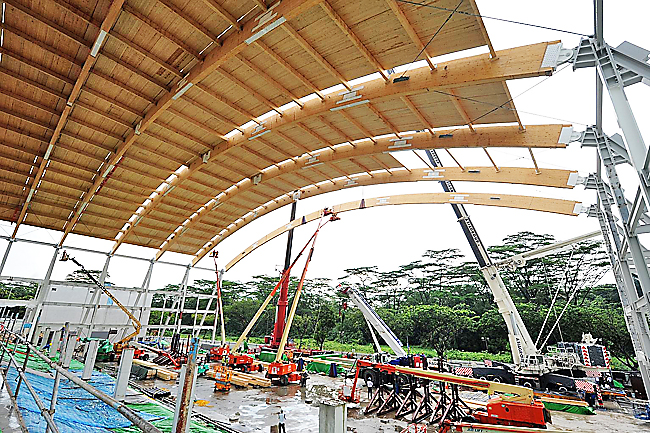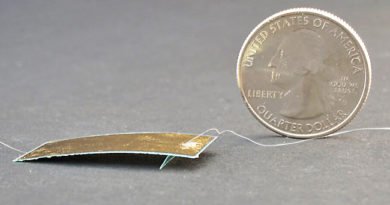TECH-EDU: Singapore to build Asia’s largest wooden university building
NTU’s new sports hall uses glued laminated timber, or glulam, for its roof. – THE STRAITS TIMES/ANN
.
SINGAPORE (The Straits Times/ANN) – Nanyang Technological University (NTU) has unveiled an ambitious five-year plan that will see Asia’s largest wooden building being constructed on its campus.
NTU President Subra Suresh said the proposed six-storey, SGD180 million building will be the new home for Nanyang Business School. When completed in 2021, it will be Asia’s largest wooden building at 40,000 gross square metres.
Professor Suresh told over 2,000 faculty and staff at a university townhall meeting, “NTU’s new academic building will be our most ambitious sustainable construction project to date.”
“Ninety-five per cent of our buildings are already certified Green Mark Platinum, and we are seeking to be the greenest university campus in the world.”
Designed by RSP Architects Planners & Engineers, the firm behind Changi Airport Terminal 4, the building located in Nanyang Drive will be constructed using technology known as mass-engineered timber. The material used will be taken from renewable forests and prefabricated for installation onsite, which is less polluting and less labour-intensive than traditional construction methods.
The building was part of what Professor Suresh called “moonshot” projects to propel NTU’s next growth phrase – which includes a drive to hire hundreds of staff to fuel its growth as a leading global research university.

From this year, NTU will support 350 new two-year post-doctoral positions for researchers. It also plans to recruit about 300 faculty members and create up to 100 new named professorships. The target is to increase named professorships available at NTU tenfold over the next five years.
NTU has identified new mechanisms to support PhD scholarships and undergraduate internships, and continues to support top undergraduates through scholarships and bursaries, Professor Suresh said.
“No deserving Singaporean student will be denied a world-class education at NTU because of financial or other impediments,” he said.
The university will also keep an eye on the environment and ban free plastic bags from October 1, a move that could save nearly 10 million plastic bags a year. An NTU spokesman said from September 3, free plastic bags will be given upon request. From October 1, plastic bags will not be issued free at all campus events and at retail and food outlets but will be sold at 20 cents each.
Proceeds from plastic bag sales will go to NTU’s assistance fund for students.
Based on an average of 1.6 plastic bags per household per day, and with NTU’s 17,000-strong community, it is looking at a “saving of almost 10 million bags per year”, added the spokesman.
NTU students welcomed the move to ban free plastic bags.
Undergraduate Aqil Hamzah, 21, said, “As a society, we’ve become so dependent on plastic bags. Students will now think of alternatives that are more environmentally friendly.”
NTU also plans to reduce energy, water and waste intensity by 35 per cent in 2021, and by 50 per cent by 2025, from 2011 levels.
Professor Suresh outlined a project to double the solar energy harnessed by next year. This will supply between seven and 10 per cent of the university’s electricity needs. | Venessa Lee |
.
 All photographs, news, editorials, opinions, information, data, others have been taken from the Internet..aseanews.net | [email protected] / For comments, Email to : Aseanews.Net | [email protected]
All photographs, news, editorials, opinions, information, data, others have been taken from the Internet..aseanews.net | [email protected] / For comments, Email to : Aseanews.Net | [email protected]









